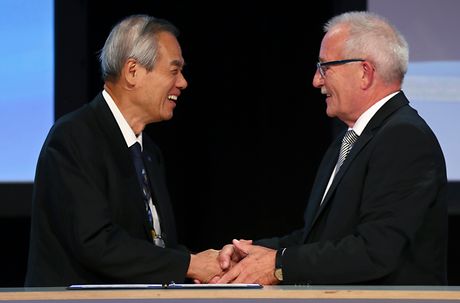
Dr. Junji Nomura and Dr. Bernard Thies sign the Frankfurt Agreement during the IEC GM 2016| DKE
| DKEFrankfurt Agreement strengthens cooperation between IEC and CENELEC
Three basic action steps were crucial regarding the implementation:
The relevance of international standardization

Although a large part of standardization is already internationally oriented - around 80 % of all electrotechnical standards already published in Germany are of international origin - the aim of the Frankfurt Agreement and its implementation is nevertheless to expand this internationality even further. In an increasing global economy, hurdles such as regional certificates or multiple testing are fatal. Time is lost and costs are incurred that are not absolutely necessary. International norms and standards remove such hurdles and thereby boost the global market. Therefore, they have a well-deserved priority over national and regional standards.
Nevertheless, it is not mandatory to adopt international standards into the national body of standards. In contrast to European standards, CENELEC members are obliged to implement them as national standards and to withdraw conflicting standards. In order to be able to enforce international standards, they must first be converted into European standards. Another, much more efficient variant is the parallel voting procedure, which was introduced in 1996 by the Dresden Agreement. It ensures that a standard is introduced both internationally and at European level at the same time - an enormous advantage because times for drafting international standards are shortened. They can be implemented more quickly and have an impact on the global market.
After signing, the implementation follows

Dr. Junji Nomura und Dr. Bernard Thies unterzeichnen das Frankfurt Agreement während des IEC GM 2016
| DKEIn mid-2015, the work on the Frankfurt Agreement was initiated by DKE and concluded with the signing of the agreement by the presidents of IEC, Dr. Junji Nomura, and CENELEC, Dr. Bernhard Thies, during the IEC General Assembly 2016 in Frankfurt.
The Frankfurt Agreement ties up to the Dresdener Abkommen from 1996. With its implementation it solves the problem that international standardization is thwarted at certain points.
By the help of the steps mentioned above, it fosters the exchange of information, increases transparency and avoids duplication of work – corresponding to the motto:
"Do it once, do it right, do it internationally." - Michael Teigeler, Managing Director of DKE
After the Frankfurt Agreement was successfully signed, representatives of the standards organizations dedicated themselves to its implementation in a working group. The first task was to generate a common understanding. Ultimately, transparency was introduced into the existing situation and a pleasing end result was achieved - an agreement that is not only based on a successful alliance, but has been actively implemented and is able to bring about real changes in the future as well. Nadine Petermann, German representative on the technical steering committee at CENELEC, agrees: "There is not only an agreement on the table, but thought has been given to the concrete implementation and this has also been actively driven forward.
The effects of the active implementation of the Agreement are thus extremely positive in terms of standardization. Day2Day management ensures better project planning - also at European level. It promotes closer cooperation and enables an earlier exchange of information. European deviations from international standards can also be reduced where necessary. This minimizes the risk of duplication and increasing resource efficiency. Most importantly, the Agreement can ensure consistent quality in standardization.
The completion of this large and important project shows that much can be achieved, if there is a strong coorperation between several parties and forces are joined. The Agreement is a great help for future developments in our increasing global world. It promotes international standardization, makes it faster and more efficient, and thus provides an enormous boost for the global economy.


